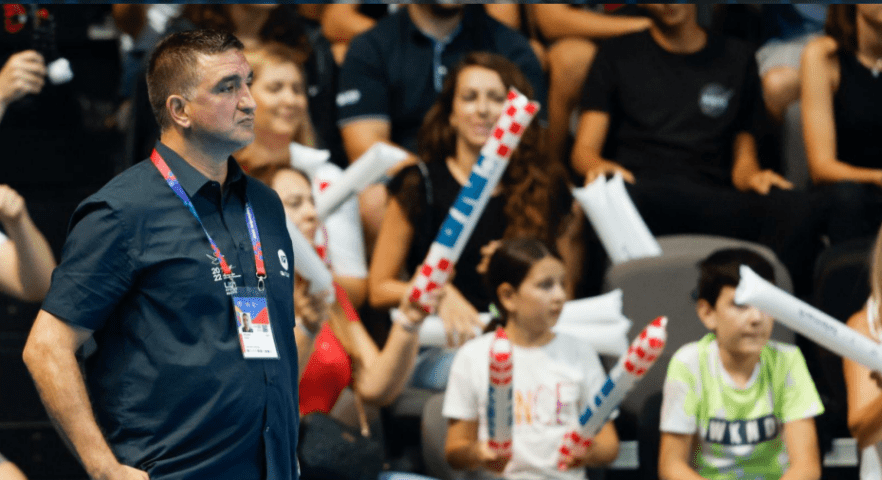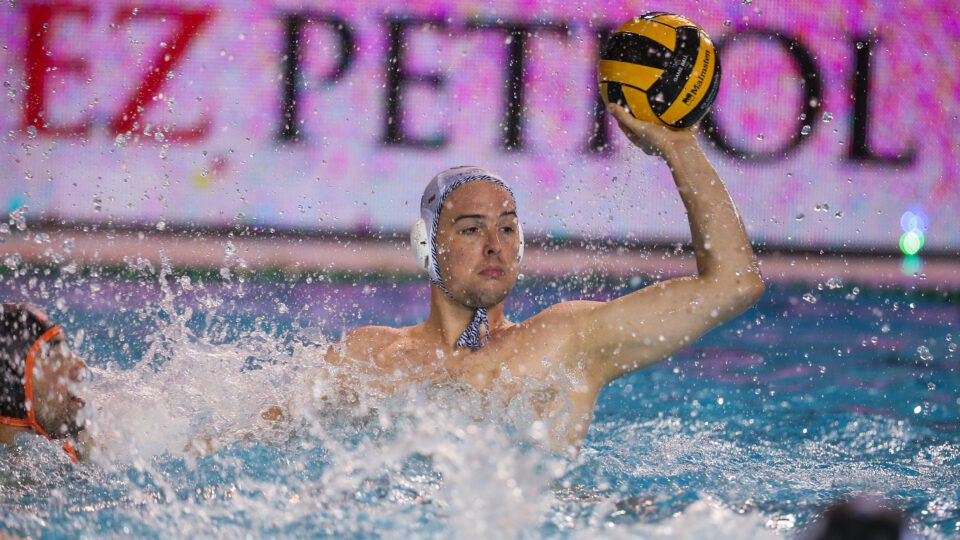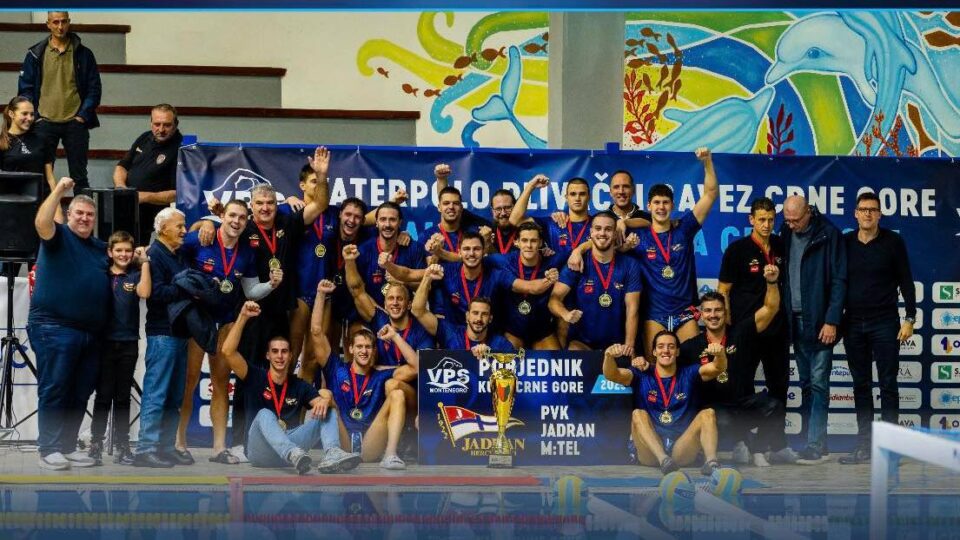Tamas Molnar, the chairman of the World Aquatics Technical Water Polo Committee, made pointed remarks against Total Waterpolo, labeling us as ‘really unprofessional,’ ‘unethical,’ and ‘provocative’ in a recent interview with the Hungarian water polo outlet VLV. Below, we bring you the full interview, where you can learn why he holds such views about us, why he claims no responsibility for anything that went wrong and why is Alexandrescu is a victim.
How do you evaluate the Olympic water polo tournaments from a professional and organizational standpoint?
I believe we witnessed a very successful Olympics, held in facilities that are nearly unparalleled. A total of 350,000 tickets were sold for the two water polo tournaments, and in the second week, whether it was a women’s or men’s match, the teams played in practically full arenas every session. This is unprecedented. It’s no coincidence that water polo ranked among the top ten Olympic sports in terms of fan interest, specifically reaching 9th place based on ticket sales. This is an incredible achievement.
From a Hungarian perspective, the result is somewhat disappointing, as we remained without a medal.
What is your opinion on officiating?
There were mistakes, but I think it’s clear that over the past two or three years, we’ve reached a higher level of officiating. Teams could prepare for very consistent, predictable officiating. Of course, there’s always someone who blames the referee when the expected result doesn’t materialize.
I should note: it was a new situation for the referees to officiate in front of 15,000 spectators in an atmosphere they’d never experienced before. I encourage everyone to try it, to take the whistle and make split-second decisions about whether it’s an exclusion, penalty, or offensive foul – these calls can have enormous consequences.
I won’t deny that the events of the Italy-Hungary quarterfinal cast a bit of a shadow on the Olympics for me. The Montenegrin referee, who had officiated at a high level until then and received very positive reviews, made a wrong decision. We should try to imagine his situation; alongside the intense atmosphere, there was a situation he perhaps didn’t see clearly, with a bleeding player on the bench. He knows the weight of such decisions. He hadn’t been in this situation before, and unfortunately, made a wrong call, which certainly influenced the game’s outcome. The decision fired up the Italians and unsettled the Hungarians slightly.
If the game had continued at 3-3, without judging the act of aggression (and that goal had been allowed), it would have been easier for everyone. The Italians’ unleashed anger worked to their advantage, leading them to a 6-4, then 8-6 lead. So, objectively, it wasn’t just this mistake—the Hungarian side missed a clear chance with Jansik and the Italians missed two penalties, with Hungary eventually winning the shootout.
We are trying to avoid such situations; the stakes and the responsibility are enormous. If such an error happens in the quarterfinals, it’s the worst outcome for us. As the head of the World Aquatics Water Polo Technical Committee, it is especially unpleasant for me that such an error occurred in a match involving the Hungarian team. The Hungarian team reached the semifinals, and I can’t fully enjoy it.
Managing that situation… I won’t even mention the name of the online portal, but it was really unprofessional—I wouldn’t even want to call it ‘unethical’. They made a big show about evaluating the referees but did not reveal who would participate in this activity, claiming it was ‘for transparency.’ From that point, the whole thing became laughable. Anyone with a bit of knowledge about this sport knows that you cannot evaluate referees just by sitting in front of a television screen. It’s not just about the decisions themselves but also several factors unseen in broadcasts, like the referee’s positioning and cooperation with their colleague. In fact, key moments in television broadcasts are often missed due to replays. To responsibly evaluate a referee’s performance, you need to be there. This was a topic of discussion at the beginning of the tournament, but we found the method unprofessional and didn’t take it seriously. Everyone knew how to handle it, but it still managed to get into people’s heads a little.
Is there any effort to make the official evaluations of referees more open?
I think if we look at other major sports, we know very little about the official assessments of referees there as well.
There has been progress in this area. Before the Olympics, we organized a workshop, and after the group stage, we held a meeting with the referees and the technical committee representatives. We not only discussed evaluations but also issued specific instructions, which we shared with the tournament’s teams so everyone knew what was expected of the referees.
I still believe that for the public, what happens in the pool is the most important.
VAR didn’t perform well at the Olympics. It turned out that disputed cases were easier to judge from the TV broadcast replays than from the official VAR footage, which clearly caused problems…
This issue already emerged at the World Championships in Fukuoka, where we managed to find a solution by the end of the tournament. The jury had access to the TV broadcast signal, and the VAR system allowed for slow-motion and zoom functions, which was a major improvement. Unfortunately, in Paris, we couldn’t secure the same standards—we didn’t receive it. Although the TV signal was present, the contracted partner couldn’t display it. I personally requested it daily, but it never happened. Determining the reason for this situation will certainly require an investigation within World Aquatics.
Adrian Alexandrescu, the other referee of the controversial Hungary-Italy match, announced his retirement, mainly criticizing that TWPC didn’t defend him from the attacks.
I believe he was more likely referring to World Aquatics; as a technical committee, we did everything we could.
A mistake in a high-stakes situation received enormous publicity. Interestingly, the error soon faded into the background, as the unacceptable behavior of the Italians drew attention away. Unfortunately, those initially wronged became the ‘bad guys.’
Ádi (Alexandrescu) unfortunately became a victim of the circumstances. Naturally, everyone involved bears some responsibility, including the delegate, the two referees, and the VAR referee. I’ve often emphasized the need for teamwork. One could argue that it wasn’t Ádi’s mistake since he was on the other side, or that the delegate didn’t take a firm enough stand on the issue. The truth is, in general, everyone knows their role, but real leadership shows only when the dam breaks.
It’s a bit like at the end of our match against the USA, when everyone kept passing the ball, and the youngest player, Vince Vigvári, was left to take the shot.
The unnamed website provocatively reported that Miskovics and Alexandrescu were banned from the Olympics following the incident. This was completely untrue; in fact, we received instructions from the World Aquatics Bureau to continue assigning them to matches. However, I would have found it inappropriate to assign these two referees as timekeepers to the placement or medal matches in the final stages. I felt it was much fairer to simply not give them any more assignments.
I would add that, based on his officiating over the last 15 years, I believe Alexandrescu fully deserved to referee a final. However, when an incident receives such attention, I don’t think anyone would accept that assignment. If I had made that decision, I would have made a fool of myself, and while I respect and care for Ádi and agree he deserved it, I don’t think he seriously believed he could be appointed to the final after such an incident. Unfortunately, he’s a victim.
I’d also mention the Slovenian Margeta, who first officiated at the Olympics in Sydney. He was sent home from the London Olympics for a trivial mistake along with his colleague. He didn’t get the final in Rio, and he couldn’t attend Tokyo due to personal reasons, so he waited a long time to officiate an Olympic final. Alexandrescu still has a chance if he wants to reach the top—he must come back, accept what happened, and keep going. I’ve never seen anyone achieve what they wanted by loudly complaining.
What is the official evaluation of the two Hungarian referees in Paris?
It’s clear that in the last two to three years, there’s been significant progress with the inclusion of female referees. In Tokyo, there were two female referees; now in Paris, there were seven, each officiating a fair number of matches. Four to five female referees are on a similar level, all very young and capable of reaching the top. The Italian woman officiated a World Championship final, as did the Greek, while the Spanish woman couldn’t because Spain was competing. For the final, both I and the technical committee considered the American lady and Nóra (Debreceni Nóra) suitable. I asked several committee members if they agreed that a man and a woman should officiate the women’s final, and almost everyone suggested Nóra.
In terms of evaluation, Nóra officiated at a high level—I hope she can bring that to the Hungarian league.
Hungarian referees are generally in a tough position because our national teams perform well. Although every referee dreams of officiating in key placement or medal games, their national team’s presence often prevents it.
As for our male referee in Paris, Tamás Kovács, he may be a bit disappointed with his assignments, especially in the last three days. But I’d say he officiated important matches well and can be proud of himself. Obviously, the fact that the Hungarian team was playing for bronze affected his “fate,” and he couldn’t have expected to officiate an Olympic final right away. For the final matches, I primarily wanted to assign referees who hadn’t had that opportunity yet, like Colombo from Italy, Gomez from Spain, and Kovács himself. But unfortunately, Kovács couldn’t be considered since Hungary was playing in the bronze match.
We naturally asked Tamás Molnár about the rule changes reported in the international press, but the sports diplomat declined to comment, saying that the decision would be made by the World Aquatics’ governing body, the Bureau.






